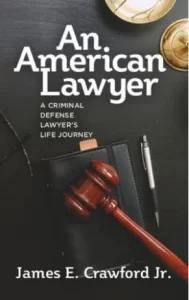Family Law
We Are a Compassionate & Aggressive Family Law Team
Our formula for success is simple: provide clients with straightforward, compassionate and competent representation, allowing the firm to excel on its own merits. The measure of this success can be seen in the stream of referrals The Law Offices of James E. Crawford, Jr. & Associates, LLC, receives from former clients who were pleased with our representation. Our stellar reputation has been built on the combination of empathy, skill and the outstanding working knowledge we have of the Maryland court system. We recognize that divorce and other family law matters present emotional and financial obstacles for each person and family. Our compassion and dedication are surpassed by no one!What You Need to Know and Do
Call us as soon as possible at (888) JCLaw-10 to set up a time to discuss your matter. The first step is picking up the phone. Or schedule a meeting via our calendar. Many times situations can be fixed and improved with simple straightforward effort. An attorney’s negotiation skills and compassion matter in divorce and family law – the two areas of practice we focus our time and energy on. It’s our job to handle your divorce or related family law matter with the utmost skill and compassion.Types of Family Law Cases We Handle
The family law attorneys at The Law Office of James E. Crawford, Jr. & Associates, LLC, represent clients in Baltimore and throughout Maryland in a wide range of family law cases including:-
- Divorce: We provide representation or both uncontested and contested divorce. These cases often involve intense negotiation and attention to detail.
- Paternity actions: Whether you want to secure your rights as a parent or pursue a biological parent for child support, we can help.
- Annulment: Annulment is the legal dissolution of a marriage as if it never existed. This is a complex process and only possible for
- Alimony: We assist clients in alimony negotiations. We have worked with clients who pay and those who receive and understand how to build a case for your needs.
- Child support: The settlement of child support is a highly contentious part of a divorce. We work hard to help resolve these questions.
- Child custody hearings: All parents wish they had more time with their kids after a divorce.
- Prenuptial agreements: Prenups help give both sides in a marriage some security for the future and settle important questions.
- Separation agreements: Separation is a necessary, but sometimes complex, step to divorce in Maryland.
- Modification: Your divorce decrees are not set in stone. We can help you pursue the changes you need.
- Violation of protective orders: When parties ignore or violate protective orders, the court initiates a contempt hearing to address it. We can help.
- Domestic violence: These are serious matters that require careful representation and strength.
- Property issues: We help clients pursue property division matters or usage of family home needs.
- Grandparent rights: Grandparents often feel left behind when it comes to their grandchildren. These are complex cases, but we can assist you.
- Relocation & move-aways: Relocation of children is always a difficult matter after a divorce. It can vastly change the custody situation and requires skilled legal attention.
- Same sex marriage issues: Legally, the LGBTQ+ community has all the same rights as anyone else in marriage and divorce. In practice, things can be more complicated.
- False allegations divorce issues: A divorce proceeding requires honesty from all participants, but false narratives muddy the waters.
- Military divorce: Divorce involving military members has many complications that other divorce matters do not.
- High asset divorces: High-asset divorce is more challenging because property division is highly complicated when that property represents significant wealth.
Why Choose JC Law as Your Family Law Firm?
Choosing the right legal representation for a family law case is a deeply personal and important decision. At JC Law, we understand the emotional complexities and potential for conflict inherent in these situations. We strive to provide compassionate and understanding support while aggressively advocating for your rights and the best interests of your family. Our experienced attorneys have a proven track record of success in navigating divorce, child custody, support, and property division matters. JC Law distinguishes itself through a client-centered approach. We prioritize open communication, actively listening to your concerns and goals to develop a tailored legal strategy that aligns with your specific needs. We believe in empowering our clients with knowledge, ensuring you understand the legal process every step of the way. Beyond legal expertise, we offer a supportive environment where you can feel heard, respected, and confident that your case is in capable hands. We are committed to achieving the most favorable outcome possible, allowing you to move forward with strength and stability.What Really Matters in Your Family Law Case?
In a family law case, amidst the legal jargon and emotional turmoil, it’s easy to lose sight of what truly matters. Ultimately, the well-being of your children and/or you should be paramount. Focusing on creating a stable and supportive environment for them, even amidst separation or divorce, will have the most lasting positive impact. Beyond the children, preserving your own sanity and financial stability is critical. This means understanding your rights and responsibilities, making informed decisions, and prioritizing solutions that minimize conflict and long-term financial strain. While emotions are unavoidable, grounding your decisions in reason and focusing on attainable, practical outcomes will serve you and your family far better than allowing anger or resentment to dictate your course. Remember that family law cases are about creating a new future, and that future should be built on a foundation of respect, fairness, and long-term well-being.What’s the Best Strategy to Navigate a Family Law Case from a Client’s Perspective?
Navigating a stressful family law case requires a multi-faceted approach that prioritizes both legal strategy and personal well-being. First and foremost, secure competent legal representation. A skilled attorney specializing in family law can provide clear guidance on your rights and responsibilities, explain the legal process, and develop a strategy that aligns with your goals. Beyond legal expertise, prioritize self-care. This might involve therapy, exercise, mindfulness practices, or simply spending time with supportive friends and family. Establishing healthy boundaries is crucial; limit contact with the other party outside of legal proceedings and resist the urge to engage in emotional arguments. Finally, manage your expectations. Family law cases can be lengthy and emotionally draining, so focus on making informed decisions, trusting your legal team, and prioritizing your mental and physical health throughout the process.Why We Sometimes Use Outside Sources and Professionals to Assist in Your Family Law Case
Navigating a family law case can be incredibly complex, requiring expertise beyond what most individuals possess. This is why it’s often necessary to utilize outside sources and professionals. Legal complexities, such as property division, child custody arrangements, and spousal support calculations, often necessitate the guidance of experienced attorneys who understand the nuances of family law. Furthermore, emotional turmoil can cloud judgment, making it difficult to objectively assess the situation and make informed decisions. Professionals like therapists and counselors can provide emotional support and help family members, especially children, cope with the stress of the legal process. Finally, certain aspects of a case may require specialized knowledge, such as forensic accounting for asset valuation, child psychologists for custody evaluations, or real estate appraisers for property division. These experts contribute valuable insights that strengthen your case and ensure the best possible outcome.Why Is it So Difficult to Make the Actual Decision to Move Forward in a Divorce or Custody Matter?
Deciding to move forward with a divorce or custody matter is rarely an easy feat. The emotional weight of ending a significant relationship, particularly one involving children, can feel paralyzing. There’s often a deep-seated fear of the unknown – uncertainty about finances, living arrangements, and the future well-being of the children. This fear, coupled with lingering hope for reconciliation or a desire to avoid conflict, can create a powerful inertia, making it incredibly difficult to take that first decisive step. Furthermore, the legal process itself can feel daunting and overwhelming. Navigating complex legal jargon, gathering necessary documentation, and potentially facing contentious negotiations or court appearances can add to the stress and anxiety. The potential for increased conflict with the other party, especially in custody disputes, can be a major deterrent. The desire to protect children from further emotional distress can also lead to hesitation, making parents question whether initiating legal action is truly in their best interest, even if it’s necessary for their well-being and the long-term stability of the family.Why JC Law Cares So Deeply About You and Your Situation in a Family Law Matter
At JC Law, we understand that family law matters are deeply personal and often incredibly challenging. They touch upon the very core of your life, impacting not only you but also your children, your finances, and your future. We care so deeply because we recognize the emotional toll these situations take. We see you as more than just a case file; we see you as an individual facing a difficult time, and we are committed to providing compassionate and understanding support. Our commitment to your family law matter stems from a genuine desire to help you navigate this complex process, protect your rights, and ultimately secure the best possible outcome for you and your loved ones. We believe that everyone deserves experienced and dedicated legal representation during these sensitive times, and we strive to provide that unwavering support. A Pledge from Jim Crawford
A Pledge from Jim Crawford
“When I started practicing law, I believed it was an absolute privilege to help people in their time of need. I still believe that with all my heart. I require all the lawyers who work in this firm to buy into one basic belief. That belief is, WE ARE HERE TO HELP YOU GET THROUGH YOUR TIME OF NEED. My pledge is as simple as that. We will do everything in our power to represent you in an ethical, forceful and proper manner. If you ever need to discuss any issue with me my door is always open and I will listen to your concerns.”
– The Law Offices of James E. Crawford, Jr. & Associates, LLC
Dedicated to You and Your Family
We’ve handled thousands of divorce and family law matters over the last 30 years. We are dedicated, empathetic and do not hesitate to work aggressively for you. Our goal is to zealously represent you and only you.
Whether your case requires vigorous negotiation, mediation, or assertive representation at trial, our attorneys have the legal knowledge and courtroom experience to protect you and your interests. Contact us at (888) JCLaw-10 or send us an email to get in touch.

